-

Erin Donahue -

Christina Barkanic -

Brittany Trott -

Emily Wiley -

Jessica Reilley -

Chris Raines -

Will Nichols -

Emily Reddy -

Michele Marchetti -

Michele Frank -

James Gherardi -

Kit Henshaw -

Christina and Erin -

Kim Tait -

Erin McKinney -

Steve Spanelli -

Sam Komlenic -

Katherine Taylor Grofic -

James Eisenstein -

Jamie Oberdick -

Anna Lombardo -

LacCreta Holland -

Tony Ricci -

Local Food Journey -

Laura Young -

Kristin Camplese -

Harrison's Fresh + Local -

Danielle Matalonis -

Kristine A. -

Linda Weaver -

Naomi Elle Schwartz -

Dana Stuchul -

Cara McShane -

Brittany Smith -

Jessica Illuzzi - Frosty
-

Jessica Paholsky -

James Sechrengost -

Brad Yeckley -

Maya Althouse -

Jordan Reabold -

Kim Chase -

Maria Bryant - Alexandrea Scott
A visit to the farmers of Groundwork Farms CSA
Posted by Jamie Oberdick on 04/14, 2015 at 08:26 AM
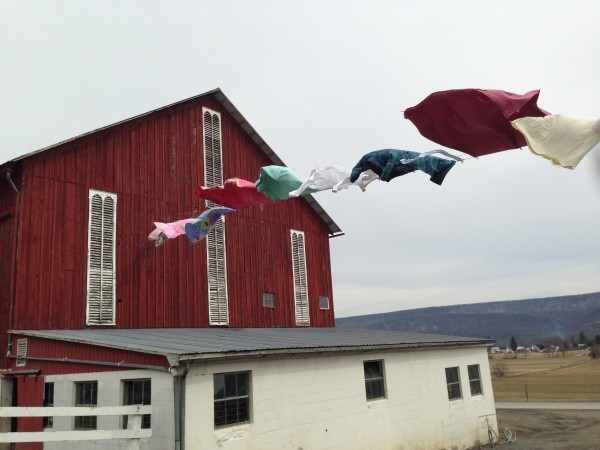
The bucolic scene at Shady Locust Produce farm
On April 2, a day that promised spring with mild breezes after a late-season snow, I visited two eastern Centre County farms at the invite of Nell Hanssen, the coordinator of Groundwork Farms CSA. The farms were Spring Bank Acres and Shady Locust Produce, both located in the beautiful countryside around Mlllheim, Aaronsburg, and Rebersburg.
First, a bit about Groundwork Farms CSA. The CSA offers food from the Penns Creek Watershed region to individuals, restaurants, and grocery stores in Centre and Union Counties. Originally limited to produce, the CSA now offers vegetables, berries, herbs, bread, flowers, dairy products, eggs, and meats. Even in the winter, CSA buyers can receive dairy products, bread, eggs, winter soups, and in-season produce. There are also opportunities to buy local fruit, flour, mushrooms, canned goods, and honey. Really, they offer a complete package of local food.
Among the local food producers in the CSA are Shady Locust Produce, King Family Farm, Halflinger Farm, Crystal Hollow Farm, and Spring Bank Acres. The two farms I visited, Spring Bank Acres and Shady Locust Produce, are Amish-run.
As I’ve mentioned, my farm tour guide for the afternoon was Nell Hanssen. You may know her as a local musician, thanks to her excellent work with both Chicken Tractor Deluxe and as a solo artist. Her “day job” is both coordinator for Groundworks and as an organic farm inspector. Her career in agriculture was sparked early on, as a young girl. “Even though I didn’t come from a farm family, I was always fascinated by agriculture,” she said. “My family couldn’t figure out why I was so into farming, we really didn’t have any connection to farming.”
Nell’s passion for farming has enabled her to have a good career in local food, and build connections with the local Amish community. I met her at the first farm for the afternoon, Spring Bank Acres. She introduced me to farmer Raymond Fisher, who runs Spring Bank with his wife, Mary. If you are a State College Farmers Market regular, you’d recognize them instantly as the friendly couple who offers up anything from raw milk to kombucha tea at their stand.
After greetings, and followed by the Fishers’ friendly dog, Raymond took me to see the spring calves. They raise cows for milking, and they will keep a few of the females and sell off the rest.
Next up was the cold frame greenhouse. In the cold frame, they grow organic greens during the winter for farmers market and restaurants. Along with the usual lettuce, kale, and spinach, they grow some unique greens such as minutina, which has a nutty taste and crunchy texture in its thin green leaves, and claytonia, also known as miner’s lettuce. “If the sun’s out, it can get pretty mild in here even if snow’s on the ground,” Raymond said.
Along with the produce, Mary supplies herbs for Groundworks herb shares, including basil, cilantro, thyme, rosemary, dill, parsley, and more. These are all organically grown.
Greens in the greenhouse at Spring Acres Farm
Next, he showed me their flock of about 300 chickens. These laying hens are free-range in the true sense, and the Fishers let them roam around within a wide space and eat whatever bugs, grasses, seeds, etc. they can find. This variety in diet, Nell explained, gives the eggs bright orange yolks and a delicious flavor. Along with going in certain CSA shares, the eggs are sold to local places like Inglebean Coffee Shop and Elk Creek Cafe. I can personally attest to how good they are, and one thing I’ve noted about the eggs is the whites seem more substantial than grocery store eggs.
Spring chickens
Moving on and letting the chickens do their thing, I got to see some of their 30 or so head of mainly Jersey milk cows in an enclosure that has an interesting purpose…creating compost for their organic gardens. While there were cows in there when I saw it, the Fishers will introduce pigs into the hay-covered enclosure for a unique reason. “They go in and root around and stir things up to make compost, sort of speed it up,” Raymond said.
So, the pigs act as living tillers. I also saw a few groups of piglets running around at the farm. Some of these will be kept as compost stirrers, while others will be sold.
Dairy cows in compost enclosure
Next up, and this I found to be one of the more interesting parts of the tour, I got to see the dairy part of the operation. Along with the standard milking room, Raymond showed me something else in the barn, a heated room where barley sprouts were growing throughout the winter. Why grow barley sprouts? Raymond explained milk quality can fall off some in the winter when cows can’t eat anything living. “Growing these sprouts give the cows something living to eat, so we can keep up milk quality when they don’t have anything living to eat in the pasture,” Raymond said. “Just eating hay makes the milk quality go down.”
Barley sprouts
Finally, I got a glimpse into where they produce their raw milk products. This includes a fairly simple looking yogurt maker, and an ice cream machine to make the delicious, homemade-style ice cream sold at the farm. Spring Bank Acres dairy products are grain-free, chemical-free, anti-biotic free, GMO-free, and not treated with rBST. I have to say, after seeing all this, I had to purchase ice cream, yogurt, eggs, milk, and cheese at their small store on the farm.
Next, Nell and I drove to Shady Locust Produce right near Rebersburg. Benuel and Sarah Lapp, an Amish couple who originally are from Lancaster County, are experienced produce growers who also run a certified-organic dairy farm.
The Lapps grow around 40 different varieties of vegetables and these are grown primarily for the shares. “We can fill about 60 share boxes through the season,” Benuel said.
Among the first things offered in late spring are things like peas, asparagus, beets, rhubarb, radishes, spring onions, lettuce, and cole crops such as broccoli. As any gardener can attest, this spring has been reluctant to begin with cold and snow in March. “We’re off to a slow start with the way spring is going,” Benuel said.
The wall in the one barn at Shady Locust Produce reflects on the farm’s history.
In early spring, they prep and till the soil for planting. They grow organic produce, and to control pests they use a few different methods including the kaolin clay Surround and row covers.
“The row covers work well for the cole crops, which get beetles early on,” Benuel said. “The row covers keep them off pretty good.”
Along with soil prep, early in the season the Benuels gather packing supplies for the shares, and organize and clean packing rooms. They also start some crops early, such as tomatoes and peppers.
This horse is a long-time and happy employee of the farm.
Once threat of frost is gone and the soil warms, things really get rolling at the farm. Tomatoes, eggplants, cucumbers, and other summer vegetables are planted in the dirt. This is when people start seeing a variety of summer goodness show up in their shares, and continue to get produce into October when fall vegetables make an appearance.
Nell’s job is making sure all this good produce and other local food items get to locavores in our area, including organizing the farmers, planning what might be grown via meetings with farmers, and promoting Groundworks. In doing so, she offers Centre and Union Counties easy access to the variety of great food that Penns Creek Watershed farmers like the Fishers and the Lapps offer. “It’s such a great area for local food,” she said. “There should be more access to it and that’s what we’re trying to do with Groundworks.”
Shares of these items are still available, and for more information please go to the Groundworks Farms website.
![]() Author: Jamie Oberdick
Author: Jamie Oberdick
Bio: Editor, Local Food Journey | Passionate about supporting local food in Central PA
- Our Local Food Journey comes to an end
- Winter isn’t a quiet time at the farm
- Get the taste of garden season right now by growing herbs indoors
- All you need to know about PASA’s Farming for the Future conference


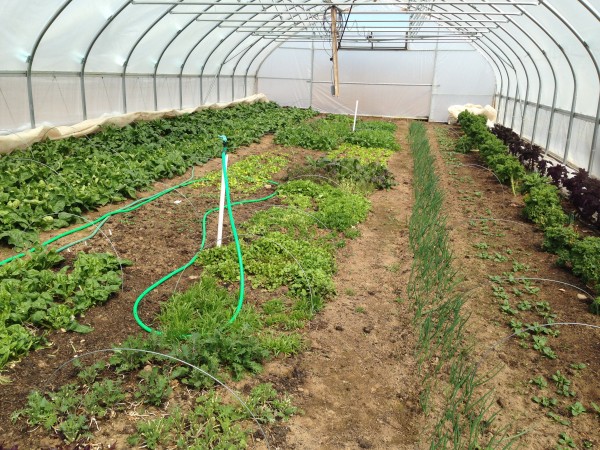
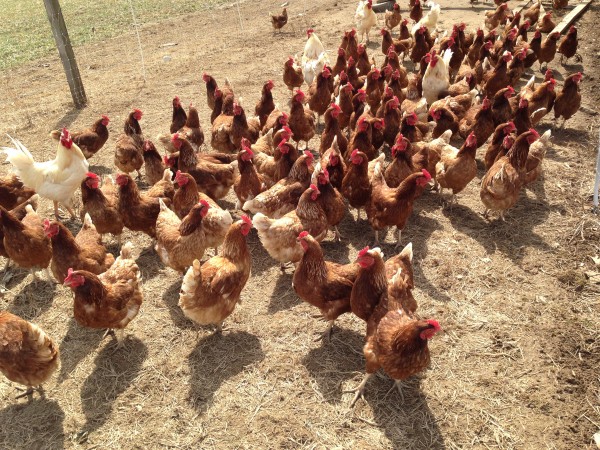
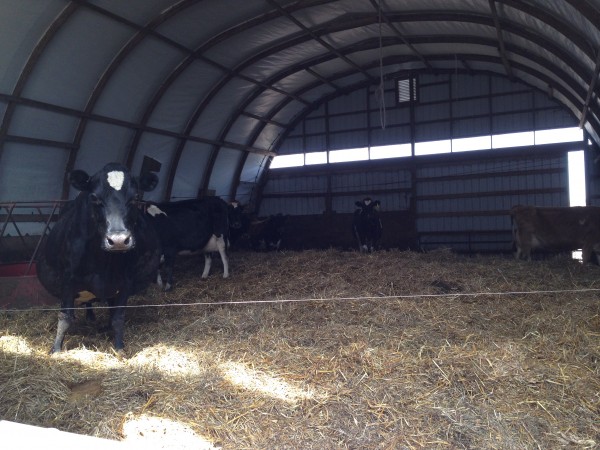
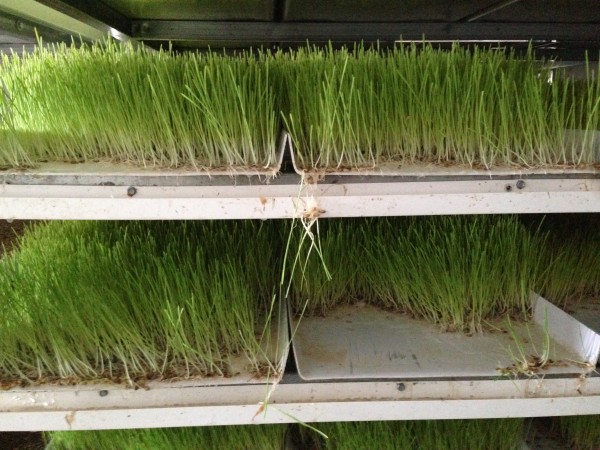
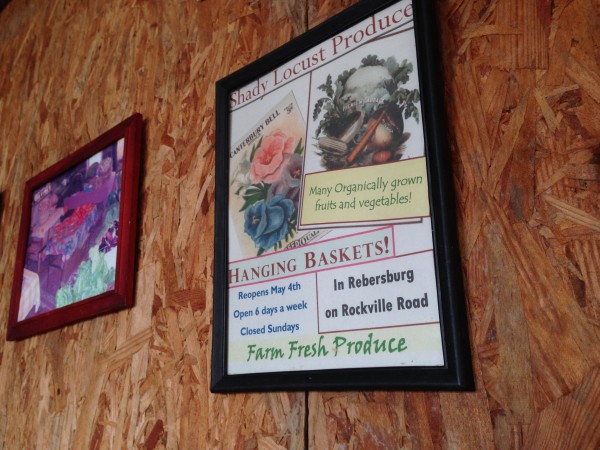
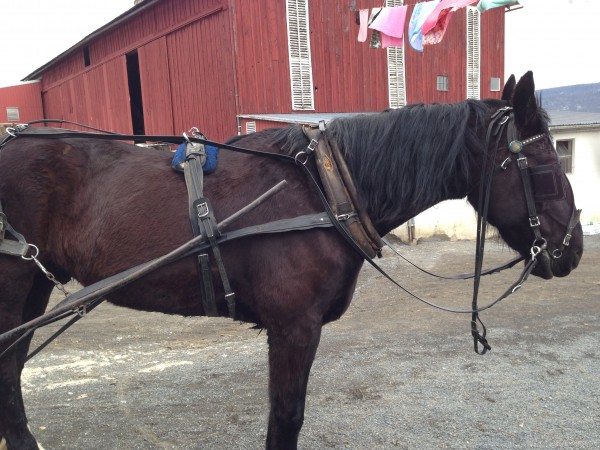
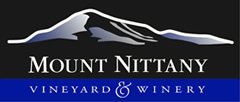

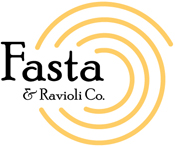

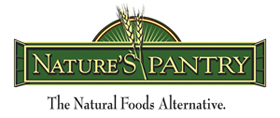
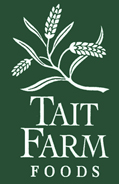

NO COMMENTS